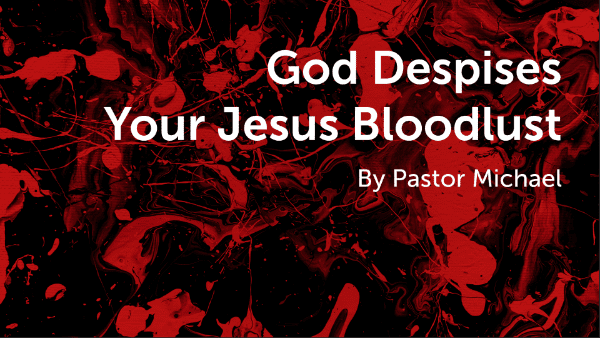A majority of Christians believe that Jesus’ spilled blood on the cross was somehow necessary for their salvation, perhaps the salvation of the entire universe. The prophet Isaiah challenges that misconception.
And before you say, “I’m a Christian and the Old Testament doesn’t apply to me,” yes, yes, it does. Without a thorough understanding of The First Testament (there is nothing “old” about it), one cannot begin to fathom the Second. Which isn’t “new” but a reframing and amalgamation of dozens of ancient myths effectively making the Second Testament a midrash on the First.

Jesus was a good and faithful Jew. His Bible, the Hebrew Bible, what too many people call the “Old Testament,” is most appropriately referred to as the Tanakh: The Torah or Pentateuch, containing Genesis through Deuteronomy; the Navi or Prophets, where we find Isaiah, Amos and others; and the Ketuvim, or writings, with the Psalms, Ecclesiastes, and other mostly existential ponderings.
The First Testament reveals Jesus’ mindset, theology, and religious history, none of which has to do with his death as repayment for sin but is about our astounding human ability to inflict horrific pain upon one another and our planet.
To truly, deeply, madly, and authentically understand Jesus, we need to learn about his Jewishness. Everything Jesus is — his lifestyle, what he thinks about God and our relationship with God, his understanding of compassion and community — are ageless Jewish ideas. His intimate connection to ancient Jewish Wisdom texts — literally and later as a literary character — provides essential context for the stories we read about Jesus in the Second Testament, also written by, for, and about Jews.
We need to know the ancient Jewish context of the First Testament because we are almost 2500 years removed from the events of Jesus’ life, and the religion that bears the name of Christos, the anointed one, is now almost exclusively about the blood sacrifice of Jesus as a sort of “final” payment to God for humankind’s corrupt nature. Too many Christians believe that “nothing but the blood of Jesus” will “save” them from “sin” and reserve them a place in Heaven. If Christians would spend more time with Jesus’ Bible, the First Testament, there is no way that could ever happen. Because the First Testament makes it clear: God despises blood sacrifices.
Isaiah 1:10–20 (CEB)
Hear the Lord’s word, you leaders of Sodom. Listen to our God’s teaching, people of Gomorrah. “What should I think about all your sacrifices?” says the Lord. “I’m fed up with entirely burned offerings of rams and the fat of well-fed beasts. I don’t want the blood of bulls, lambs, and goats.When you come to appear before me, who asked this from you, this trampling of my temple’s courts? Stop bringing worthless offerings. “Your incense repulses me. New moon, sabbath, and the calling of an assembly — I can’t stand wickedness with celebration! I hate your new moons and your festivals. They’ve become a burden that I’m tired of bearing.
When you extend your hands, I’ll hide my eyes from you. Even when you pray for a long time, I won’t listen.“Your hands are stained with blood. Wash! Be clean! Remove your ugly deeds from my sight. Put an end to such evil; learn to do good. Seek justice: help the oppressed; defend the orphan; plead for the widow.
Come now, and let’s settle this,” says the Lord. “Though your sins are like scarlet, they will be white as snow. If they are red as crimson, they will become like wool. If you agree and obey, you will eat the best food of the land. But if you refuse and rebel, you will be devoured by the sword.” The Lord has said this.
This passage from Isaiah makes it highly improbable any Jew ever thought of Jesus as a blood sacrifice to appease an angry God or absolve humanity from “sin.” If God doesn’t want the blood of bulls, lambs, and goats, how could God possibly want the blood of Jesus? Same question if Jesus is God on the cross: If God despises blood sacrifices — as scripture clearly states — how can God desire even God’s own blood?
Christians reading the First Testament would know Jesus did not die for their sins. Nor did he need to. But Christians seem to have missed the point of Jesus, as evidenced by the lyrics of the unfortunately popular hymn “Nothing but the Blood of Jesus:”
What can wash away my sin?
Nothing but the blood of Jesus.
What can make me whole again?
Nothing but the blood of Jesus.
O precious is the flow
that makes me white as snow;
no other fount I know;
nothing but the blood of Jesus.
Jesus would never say his blood is what “makes me whole again,” but rather that doing good, seeking justice, helping the oppressed, defending the orphan, and pleading for the widow are the proper actions of God-bearing souls like him. Our hands are indeed washed in the blood of Jesus, but the only thing that will once again make them “white as snow” (and we need to mark here the racist nature of that sentiment for later examination) is not his death on the cross but our continued work in his name toward an equitable and prosperous world for all. One where we notice that lyrics like “white as snow” are about protecting the Empire, not replacing it.
Jesus wants followers who sacrifice for the common good. Not idolators worshipping a sacrifice.

As early as the 8th Century BCE — that’s about 750 years before Jesus’ birth — his Jewish ancestors were already sensing that all their blood ransoms and burnt offerings were empty rituals — excuses for not treating each other with the kindness, compassion, love, and grace God showed to them, and in return commanded them, and still commands us to show others.
Isaiah is profoundly important to the Jesus saga and Christians ignore the text at their peril. Isaiah is the prophet Jesus reads at the beginning of his ministry and with whom the authors of the Second Testament clearly most associate with Jesus and his mission. In words impossible to misunderstand, Isaiah voices God’s displeasure with blood sacrifices and burnt offerings.
Remember, when the Bible talks about what God likes or doesn’t like, what it is legitimately revealing is not about God (because, as my Jewish grandparents used to say, who knows?) but about how humans consider the nature of God and our interactions with God and each other.
The value of the Bible is that it is a record of the way we have perceived our relationship with God and one another for thousands of years. It reveals a vibrant evolution away from literalism and blood sacrifices and toward mystical knowing — a personal sense of God within us, around us, and in everything.
It’s knowing God in the intimate way of Jesus that changes our lives, which then changes our attitudes about others, and our actions in the world until we’re transformed into the peaceful, equitable, respectful, innovative civilization Jesus — and so many others, before and since — imagined.
Long ago and far away, we offered God the blood of lambs and bulls. Here and now, Christians offer the blood of Jesus. But Isaiah lambasts the image of a bloodthirsty God and makes it clear God does not want anybody’s blood. A thousand years before Jesus, the people evince a more enlightened understanding of a God who doesn’t require the superficial trappings of empty ritual but demands we act like merely decent human beings.
God despises blood sacrifices because they do nothing to make the world better.
They don’t ease the suffering of enslaved and disenfranchised people. They don’t right the inequal scales of justice. They don’t redistribute wealth and ensure food gets to the hungriest first. Only our actions do that. Bold, daring acts, like the ones Jesus takes time and again to wake people up and out of their bloodlust-induced coma.
Hear the Lord’s word: Stop bringing worthless offerings. Bring me something of substance: a commitment to justice, equality, and equity. Don’t burn a chicken for me; cook dozens and give them to the hungry. Build shelters for the homeless. Treat each other fairly. Don’t hoard your wealth; use it for the common good. In fact, give it all away for love. This is how I know your faith: by your love for one another, not your blood sacrifices to me. So says the Lord.
Amen.
Question: How do the First and Second Testaments — together — affect your view of substitutionary atonement?


